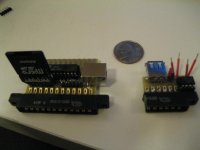bitfixer
Veteran Member
Hey there PET fans,
I had some time in the last few days, and hacked up a simple drive emulator for a PET.
It's in the breadboard stage right now, but I can save and load programs to/from a FAT32 formatted SD card attached to an Atmel ATMEGA16 microcontroller.
It doesn't support D64 disk images, but I can load and save .prg files to the card.
If people are interested I'll be posting schematics and source code within the next couple of days.
Parts required are a ATMEGA16, micro-sd adapter, and a cable to connect to the IEEE-488 port on the PET: an edge connector and ribbon cable will work.
Some pics of the project so far:
http://www.flickr.com/photos/25219890@N06/sets/72157626969258483/
I had some time in the last few days, and hacked up a simple drive emulator for a PET.
It's in the breadboard stage right now, but I can save and load programs to/from a FAT32 formatted SD card attached to an Atmel ATMEGA16 microcontroller.
It doesn't support D64 disk images, but I can load and save .prg files to the card.
If people are interested I'll be posting schematics and source code within the next couple of days.
Parts required are a ATMEGA16, micro-sd adapter, and a cable to connect to the IEEE-488 port on the PET: an edge connector and ribbon cable will work.
Some pics of the project so far:
http://www.flickr.com/photos/25219890@N06/sets/72157626969258483/

